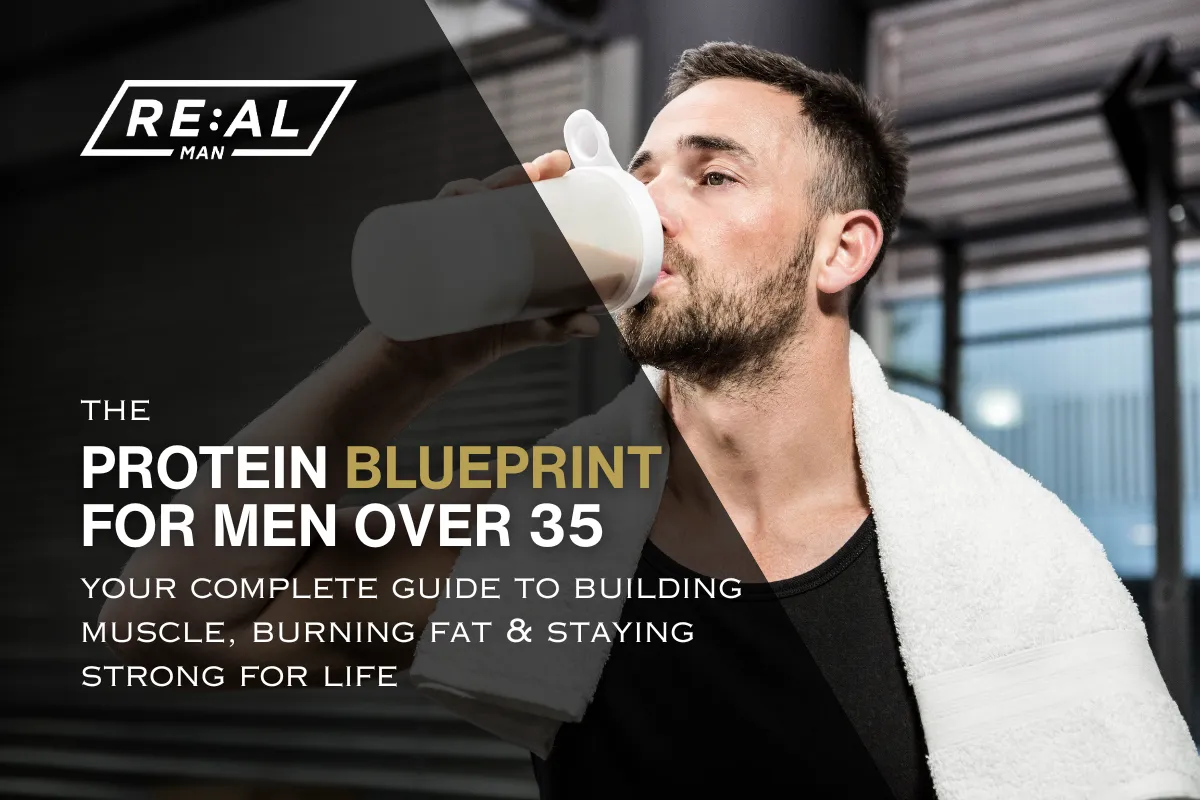
The Protein Blueprint for Men Over 35: Your Complete Guide to Building Muscle, Burning Fat & Staying Strong for Life
If you’re a man over 35, protein isn’t just another “nutrition tip” — it’s the single most important nutrient for keeping your muscle, strength, and vitality as you age.
In this guide, I’ll show you exactly how much protein you need, the best sources to choose, and how to time it for maximum performance, recovery, and fat loss—while cutting through the myths and confusion that hold most men back.
By the end, you’ll have a clear, actionable protein plan you can start today to build a stronger body, boost your energy, and stay lean for life.
Why This Matters to You
Muscle retention: Studies show that after age 30, men lose up to 3–5% of muscle mass per decade unless they actively train and consume adequate protein.
Fat loss advantage: Higher-protein diets increase satiety, preserve muscle during calorie deficits, and raise calorie burn through the thermic effect of food (protein burns more calories to digest than carbs or fats).
Performance boost: Research on athletes and active adults confirms that protein improves recovery speed, strength gains, and training adaptations.
Healthy aging: Seniors who consume more protein maintain mobility, independence, and bone strength for longer.
I’ve worked with hundreds of high-performance men who all shared one common trait before we fixed it—they under-ate protein. Once we dialled it in, results accelerated within weeks.
3 reasons most men over 35 fail to get enough protein:
1. They underestimate how much they need.
You might think you’re “getting plenty” because you eat meat at dinner, but most men fall 30–50% short of the optimal daily target.
2. They don’t prioritise quality or distribution.
Skipping protein at breakfast or snacks means you’re missing key opportunities for muscle protein synthesis.
3. They believe outdated myths.
From “too much protein damages your kidneys” to “high protein makes you bulky,” misinformation keeps men from eating enough.
Here’s my 3-Step Protein Power Plan for men over 35:
Step 1 – Know Your Number
Your protein target depends on your goal, body weight, and activity level:
Why this matters: Your protein needs go up, not down, as you age—especially during weight loss, training, or recovery.
Step 2 – Prioritise Quality Sources
Animal sources (complete proteins, high in leucine, highly bioavailable):
• Chicken breast (31g per 100g)
• Salmon (25g per 100g)
• Lean beef (26g per 100g)
• Eggs (6g per large egg)
• Greek yoghurt (10g per 100g)
• Whey protein powder (~25g per scoop)
Plant sources (combine for full amino acid profile):
• Lentils (9g per 100g cooked)
• Chickpeas (8g per 100g cooked)
• Tofu (8g per 100g)
• Quinoa (4g per 100g cooked)
• Pea protein powder (~20g per scoop)
Pro tip: Look for leucine-rich sources—around 2–3g per meal triggers muscle protein synthesis most effectively.
Step 3 – Time It Right
Muscle protein synthesis is maximised when protein is spread evenly across the day, not crammed into one or two meals.
Best practices:
• 3–5 protein feedings/day (20–40g per meal for most men)
• Post-workout: Include 20–40g protein within 1–2 hours to support recovery.
• Bedtime protein: A slow-digesting source like casein may help overnight muscle repair.
What Protein Does in Your Body
Protein isn’t just for muscle—it’s the raw material for:
• Hormones (like testosterone and growth hormone)
• Enzymes (critical for digestion and metabolism)
• Antibodies (immune function)
• Collagen (tendons, ligaments, skin health)
Essential vs Non-Essential Amino Acids
Essential (9): Must come from diet (e.g., leucine, lysine, tryptophan)
Non-essential (11): Body can produce
BCAAs: Leucine, isoleucine, valine—especially potent for muscle growth
Protein and Aging
Lower appetite and reduced anabolic sensitivity mean you may need more protein per meal to get the same muscle-building response.
Resistance training + higher protein is the gold standard for combating age-related muscle loss (sarcopenia).
Busting 3 Common Myths
1. “High protein damages your kidneys.”
No evidence supports this in healthy people. Kidney stress only occurs in those with existing kidney disease.
2. “High protein weakens your bones.”
The opposite is true—protein supports bone density, especially when paired with strength training and adequate calcium.
3. “Too much protein will make me bulky.”
Muscle gain requires a calorie surplus + resistance training; simply eating protein will not cause unwanted bulk.
Action Steps
1. Calculate your daily target (see Step 1 chart).
2. Create a daily protein plan with at least 3 main meals and 1–2 high-protein snacks.
3. Track for 7 days using an app like MyFitnessPal or Cronometer to see if you’re hitting your target.
4. Adjust portion sizes and sources to meet your goal without overshooting calories.
Identity Reinforcement
“I fuel my body with purpose. Every meal is an opportunity to stay strong, lean, and high-performing—now and for decades to come.”
